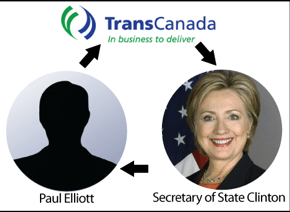Friends of the Earth, Corporate Ethics International, and the Center for International Environmental Law just filed a lawsuit against the U.S. State Department and Hillary Clinton (Friends of the Earth v. State Department) over the agency’s controversial handling of the Keystone XL pipeline proposal.
The suit follows an extensive effort by the environmental groups to seek information via the Freedom of Information Act (FOIA) about contacts between Secretary of State Hillary Clinton and Paul Elliott, a lobbyist for TransCanada Pipelines – the company seeking to build the disastrous Keystone XL pipeline to carry dirty tar sands crude from Alberta to Gulf Coast refineries in Texas. Secretary Clinton’s State Department is mulling whether to grant a thumbs up or down to TransCanada’s request for a presidential permit to build and operate the 1,959-mile tar sands pipeline.
Elliott was the national deputy director of Hillary Clinton’s presidential run, assisting her efforts to win support of delegates and strengthening her ties with influential Democratic governors to win endorsements.
In his current role as a registered lobbyist for TransCanada, Elliott would obviously be in a good position to reach out to Secretary Clinton’s office to lobby for the Keystone XL pipeline.
Suspicions that such lobbying pressure had occurred were stoked by Secretary Clinton’s inappropriate public statements in California last fall, where she told an audience that she was “inclined to” approve the Keystone XL project.
Many environmental groups called on Clinton to recuse herself from the Keystone XL pipeline decision, noting that her tentative nod of approval was extremely premature. The State Department had not yet completed its mandated environmental impact statement, nor reviewed the huge numbers of public comments about the merits and demerits of the Keystone XL project.
So how had Secretary Clinton reached her inclination to approve the pipeline without waiting on the due diligence of her State Department staff?
Whether or not Elliott did contact Secretary Clinton or her staff remains to be seen, largely because the State Department rejected the groups’ December 2010 FOIA request seeking records of any contacts between Elliott and the State Department. Independent FOIA experts, as well as the environmental groups, contend that the State Department’s denial of the FOIA request was illegitimate.
While the State Department did accept a subsequent FOIA request from Friends of the Earth in February, it failed to meet the deadline to respond.
“Why is the State Department refusing to release these communications?,” asked Erich Pica, president of Friends of the Earth. “This calls into question the agency’s decision to rush the review of the Keystone XL pipeline, despite its massive environmental risks and bipartisan opposition to it.”
After exhausting all other options to get the State Department to come clean about its contacts with Elliott, the groups announced today that Earthjustice has filed suit on their behalf against the State Department and Hillary Clinton in her official capacity as Secretary of State.
“Clearly, TransCanada hired Mr. Elliott to take advantage of his previous service to Hillary Clinton,” said Kenny Bruno with Corporate Ethics International. “We think the public has a right to know in what ways TransCanada and Mr. Elliott have attempted to influence Secretary Clinton’s view of this controversial project.”
Read the complaint filed by Earthjustice [PDF] on behalf of the environmental groups.
Subscribe to our newsletter
Stay up to date with DeSmog news and alerts






